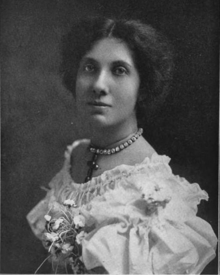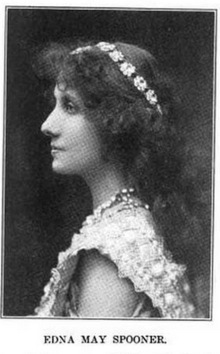Edna May Spooner
Edna May Spooner (May 10, 1873 – July 14, 1953), sometimes spelled as Edna Mae Spooner, was an American actress, playwright, and vaudeville performer.
Edna May Spooner | |
|---|---|
 Spooner in a 1907 publication | |
| Born | May 10, 1873 Centerville, Iowa, U.S. |
| Died | July 14, 1953 (aged 80) Sherman Oaks, California, U.S. |
| Nationality | American |
| Occupation | Actor |
Early life
Edna May Spooner was born in Centerville, Iowa, the daughter of Benjamin Spurgeon "Spurge" Spooner and Mary Gibbs Manson "Mollie." Spooner. Her parents founded the Spooner Stock Company, a touring company of actors. Her mother was a member of the New York Theatrical Managers' Association. Her younger sister was actress and director Cecil Spooner, who married playwright Charles E. Blaney.[1] Her maternal uncle was actor Corse Payton.
Career

Spooner and her sister toured and performed with the Spooner Stock company for many years.[2][3] "The springtime and the Spooners have come again," commented writer Willa Cather, on the family's perennial appearances in Lincoln, Nebraska.[4]
Spooner was a fixture in Brooklyn's theatres.[5] She and her mother and sister leased and ran the Bijou Theatre for several years.[6] and she had her own company, the Edna May Spooner Stock Company.[7][8][9] The Spooners also ran a theatre in New Orleans, Louisiana for a time.[10][11] She also directed shows, with her mother as manager and her sister as actress.[12][13] Some of her popular roles were in Ullie Akerstrom's St. Elmo (1910),[14] Zaza,[15] Camille, Juliet, Nell Gwynne.[16]
Spooner appeared on Broadway in Babbling Brookes (1927), and in one silent picture, Man and Wife (1923). She wrote a historical drama, Madame du Barry (1908), and translated and adapted The Obstinate Family, a German one-act farce.
Controversies
In 1901, Spooner and slightly younger fellow actress Edna May were engaged in legal and publicity struggles over their shared given name. In the end, both women continued to be called "Edna May" in professional contexts.[17] In 1902, Spooner received a written death threat from a disgruntled theatre worker, angry that her mother would not hire him.[18]
Personal life
In 1912, Edna May Spooner married fellow actor Arthur Behrens, also known as Arthur Whaley.[19] They divorced in 1921.[20] She was active in the Iowa New Yorkers, a club for Iowa natives in New York City,[21] and in the Actors' Church Alliance.[22][23] She retired from the stage in 1929, moved from Connecticut to California with her sister in 1947, and died in 1953, in Sherman Oaks, California, aged 80 years.[24]
References
- "Cecil Spooner and her Bronx Theatre" Bronx Times Reporter (January 12, 2006).
- Johnson Briscoe, The Actors' Birthday Book (Moffat, Yard 1907): 112.
- "Spooner Co. Not to Disband" New York Times (June 25, 1908): 9. via ProQuest
- The Kingdom of Art: Willa Cather's First Principles and Critical Statements, 1893–1896 (University of Nebraska Press 1967): 275. ISBN 9780803200128
- "Edna Spooner Here in New Play" Brooklyn Daily Eagle (September 3, 1912): 4. via Newspapers.com

- "A Toy Theatre to be Managed by Two Girls" The Theatre (June 1913): 168.
- "Change of Policy at Brooklyn Theaters" Brooklyn Daily Eagle (February 10, 1909): 16. via Newspapers.com

- "Miss Spooner Coming to Broadway Again" New York Star (October 3, 1908): 13.
- "Miss Spooner's Success" New York Star (October 17, 1908): 29.
- "New Orleans" "'New York Dramatic Mirror (January 8, 1910): 15.
- "Spooners Take Theatre in New Orleans La." Brooklyn Daily Eagle (July 23, 1909): 5. via Newspapers.com

- "Three Very Talented Women of the Stage" Broadway Weekly (September 8, 1905): 18.
- "Five Hundred Nights on Broadway: The Remarkable Achievement of Miss Edna May Spooner" Mercantile and Financial Times (March 28, 1908): 2.
- "Bijou, Brooklyn — St. Elmo" New York Dramatic Mirror (February 5, 1910): 7.
- "Spooner Stock Co. for Keith & Proctor" New York Times (April 27, 1907): 9. via ProQuest
- Anne Commire and Deborah Klezmer, eds. "Spooner, Edna May (1873–1953)" Dictionary of Women Worldwide: 25,000 Women Through the Ages (Yorkin Publications, 2007): 1771. via Gale Virtual Reference Library.
- "What's in a Name?" The Pottery, Glass & Brass Salesman (August 9, 1917): 20.
- "To Kill" Lincoln Journal Star (March 4, 1902): 6. via Newspapers.com

- "Edna May Spooner Weds" New York Times (December 19, 1912): 15.
- Harvey Douglass, "When Brooklyn Went Stage Struck" Brooklyn Daily Eagle (March 24, 1933): 17. via
- "The Iowa New Yorkers" New York Dramatic Mirror (March 5, 1910): 8.
- "Actors' Church Alliance News" New York Dramatic Mirror (April 30, 1910): 9.
- Frank S. Arnett, "The Church and the Stage" Munsey's Magazine (March 1904): 905.
- "Miss Edna May Spooner" New York Times (July 16, 1953): 21. via ProQuest
External links
| Wikimedia Commons has media related to Edna May Spooner. |